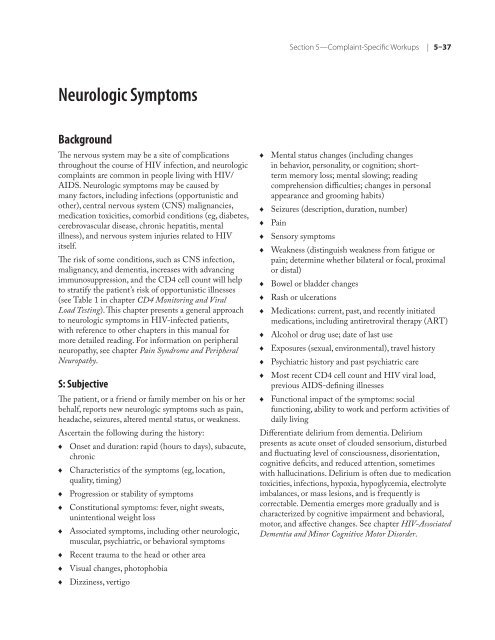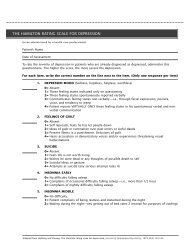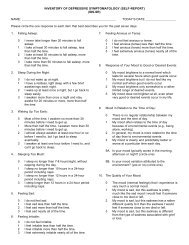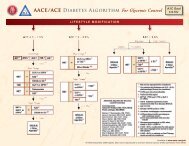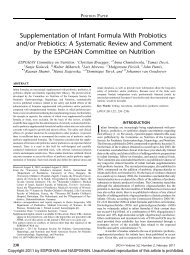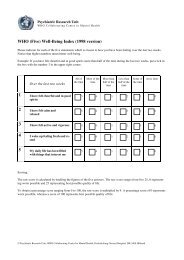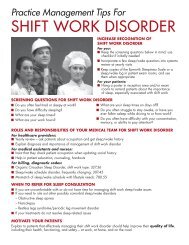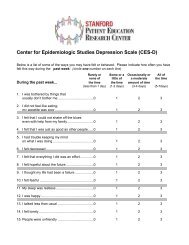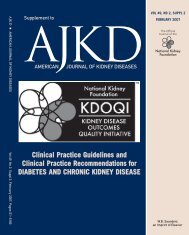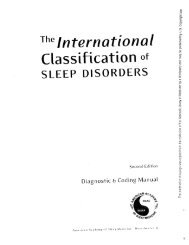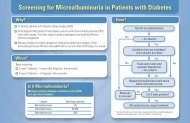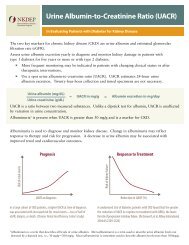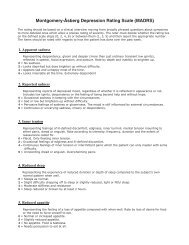Clinical Manual for Management of the HIV-Infected ... - myCME.com
Clinical Manual for Management of the HIV-Infected ... - myCME.com
Clinical Manual for Management of the HIV-Infected ... - myCME.com
You also want an ePaper? Increase the reach of your titles
YUMPU automatically turns print PDFs into web optimized ePapers that Google loves.
Neurologic Symptoms<br />
Background<br />
The nervous system may be a site <strong>of</strong> <strong>com</strong>plications<br />
throughout <strong>the</strong> course <strong>of</strong> <strong>HIV</strong> infection, and neurologic<br />
<strong>com</strong>plaints are <strong>com</strong>mon in people living with <strong>HIV</strong>/<br />
AIDS. Neurologic symptoms may be caused by<br />
many factors, including infections (opportunistic and<br />
o<strong>the</strong>r), central nervous system (CNS) malignancies,<br />
medication toxicities, <strong>com</strong>orbid conditions (eg, diabetes,<br />
cerebrovascular disease, chronic hepatitis, mental<br />
illness), and nervous system injuries related to <strong>HIV</strong><br />
itself.<br />
The risk <strong>of</strong> some conditions, such as CNS infection,<br />
malignancy, and dementia, increases with advancing<br />
immunosuppression, and <strong>the</strong> CD4 cell count will help<br />
to stratify <strong>the</strong> patient’s risk <strong>of</strong> opportunistic illnesses<br />
(see Table 1 in chapter CD4 Monitoring and Viral<br />
Load Testing). This chapter presents a general approach<br />
to neurologic symptoms in <strong>HIV</strong>-infected patients,<br />
with reference to o<strong>the</strong>r chapters in this manual <strong>for</strong><br />
more detailed reading. For in<strong>for</strong>mation on peripheral<br />
neuropathy, see chapter Pain Syndrome and Peripheral<br />
Neuropathy.<br />
S: Subjective<br />
The patient, or a friend or family member on his or her<br />
behalf, reports new neurologic symptoms such as pain,<br />
headache, seizures, altered mental status, or weakness.<br />
Ascertain <strong>the</strong> following during <strong>the</strong> history:<br />
♦<br />
♦<br />
♦<br />
♦<br />
♦<br />
♦<br />
♦<br />
♦<br />
Onset and duration: rapid (hours to days), subacute,<br />
chronic<br />
Characteristics <strong>of</strong> <strong>the</strong> symptoms (eg, location,<br />
quality, timing)<br />
Progression or stability <strong>of</strong> symptoms<br />
Constitutional symptoms: fever, night sweats,<br />
unintentional weight loss<br />
Associated symptoms, including o<strong>the</strong>r neurologic,<br />
muscular, psychiatric, or behavioral symptoms<br />
Recent trauma to <strong>the</strong> head or o<strong>the</strong>r area<br />
Visual changes, photophobia<br />
Dizziness, vertigo<br />
♦<br />
♦<br />
♦<br />
♦<br />
♦<br />
♦<br />
♦<br />
♦<br />
♦<br />
♦<br />
♦<br />
♦<br />
♦<br />
Section 5—Complaint-Specific Workups | 5–37<br />
Mental status changes (including changes<br />
in behavior, personality, or cognition; shortterm<br />
memory loss; mental slowing; reading<br />
<strong>com</strong>prehension difficulties; changes in personal<br />
appearance and grooming habits)<br />
Seizures (description, duration, number)<br />
Pain<br />
Sensory symptoms<br />
Weakness (distinguish weakness from fatigue or<br />
pain; determine whe<strong>the</strong>r bilateral or focal, proximal<br />
or distal)<br />
Bowel or bladder changes<br />
Rash or ulcerations<br />
Medications: current, past, and recently initiated<br />
medications, including antiretroviral <strong>the</strong>rapy (ART)<br />
Alcohol or drug use; date <strong>of</strong> last use<br />
Exposures (sexual, environmental), travel history<br />
Psychiatric history and past psychiatric care<br />
Most recent CD4 cell count and <strong>HIV</strong> viral load,<br />
previous AIDS-defining illnesses<br />
Functional impact <strong>of</strong> <strong>the</strong> symptoms: social<br />
functioning, ability to work and per<strong>for</strong>m activities <strong>of</strong><br />
daily living<br />
Differentiate delirium from dementia. Delirium<br />
presents as acute onset <strong>of</strong> clouded sensorium, disturbed<br />
and fluctuating level <strong>of</strong> consciousness, disorientation,<br />
cognitive deficits, and reduced attention, sometimes<br />
with hallucinations. Delirium is <strong>of</strong>ten due to medication<br />
toxicities, infections, hypoxia, hypoglycemia, electrolyte<br />
imbalances, or mass lesions, and is frequently is<br />
correctable. Dementia emerges more gradually and is<br />
characterized by cognitive impairment and behavioral,<br />
motor, and affective changes. See chapter <strong>HIV</strong>-Associated<br />
Dementia and Minor Cognitive Motor Disorder.


